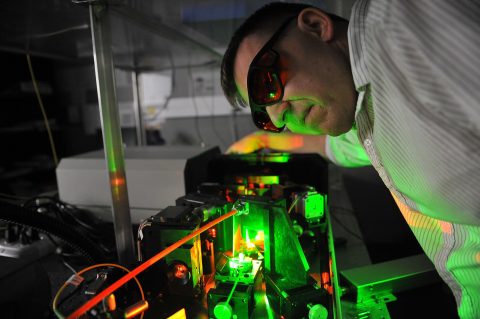Science Foundations (Cert)
Why study Science Foundations?
The Certificate in Science Foundations is a non-degree program that caters to students who wish to develop the necessary background for further study in undergraduate degree programs in Science. It also may be of interest to students whose preference is to follow a shorter program of study or who wish to update their knowledge or learn important basics of science.
Program highlights
- Build your confidence and academic experience before applying to a science degree program
Program structure
Program option
- Certificate in Science Foundations (30 credits)
The certificate requires successful completion of 30 credits. At least 24 of these credits must be chosen from courses offered by three departments in the Faculty of Arts and Science. Students may transfer into the certificate program up to 12 credits earned in an incomplete degree or certificate program or as an Independent student, provided they are students in good standing. The credits that may be so transferred are determined by the University at the point of entry into the program. Students who are admitted to the Certificate in Science Foundations, and who wish to continue in a degree program, should apply for admission to their program within the first 30 credits.
30 Certificate in Science Foundations
3 BIOL 2013
6 CHEM 2053, CHEM 2063
9 MATH 2033, MATH 2043, MATH 2053
12 PHYS 2043, PHYS 2053, PHYS 2063, PHYS 2241, PHYS 22511, PHYS 2261
NOTE: In the event that a student is awarded an exemption from a required course, it will be necessary for the student to replace that course with another relevant to the program, chosen from this list or in consultation with an academic advisor.
BIOL 2253, BIOL 2263, CHEM 2213, CHEM 2223, CHEM 2713, GEOG 2603, GEOL 2103, MAST 2173, MAST 2183, MAST 2213, MAST 2343, PHYS 2323, PHYS 2523, PHYS 2533
Courses
United States students: A U.S. Federal Student Aid-eligible version of this program is offered. This version meets all U.S. regulations (such as no co-operative education or e-courses) for eligible programs.
Admission criteria
Minimum cut-off averages and course requirements
- Quebec CEGEP: DEC
- High School: C+
- ACT or SAT is NOT required
- Canadian curricula course requirements
- Accepted international qualifications
- International Baccalaureate (IB) diploma: 26
- Baccalauréat français: 11
- British system of education (GCE):
- A-levels: At least two A-level exams CD or
- AS-levels: At least 4 AS-level exams with equivalent results or
- BTEC: Level 3 Diploma or Extended Diploma in a related subject area with equivalent results
- Additional information for British System of Education (GCE) applicants
- University Transfers (internal/external): C
Minimum cut-off averages should be used as indicators. The cut-off data may change depending on the applicant pool. Applicants who meet the stated minimum requirements are not guaranteed admission to these programs.
Application deadlines

FALL TERM
March 1 is the deadline to apply for fall term entry. International students are encouraged to apply by February 1 to allow sufficient time for CAQ and study permit application processing.

WINTER
November 1 is the deadline to apply for winter term entry. International students are encouraged to apply by September 1 to allow sufficient time for CAQ and study permit application processing.
Not all programs are available for winter term entry. Please check program availability for the term, before you start your application.
We reserve the right to close admission to a program at any time after the official deadline without prior notice.
After your degree
Thanks to Concordia's emphasis on taking an interdisciplinary approach to your field of study, you'll graduate with a depth of knowledge informed by an understanding of how your subject connects to the wider world. You'll be ideally positioned to succeed in a professional role that demands rigorous analytical thinking, sharp communication skills and the ability to approach problem-solving from multiple dimensions.
Student stories

Scarlet Guy
Bachelor of Arts Honours History: Public History
Find out how Scarlet Guy discovers a world of interdisciplinary learning and community support in the Faculty of Arts and Science.
Other programs of interest

Get inspired by life. Immerse yourself in the study of life at all levels: from the edge of biochemistry through cell biology and the physiology of multicellular organisms to the interactions between organisms and their environment.
Department
Faculty

As a chemist, your mastery of chemical reactions could lead to the creation of environmentally-friendly materials like compostable plastics or medications that fight disease.
Department
Department of Chemistry and Biochemistry
Faculty

Today physicists build lasers, design medical imaging machines and develop applications for nanotechnology.
Department
Faculty

If you want to explore different fields of study, prefer to follow a shorter program, or earn university credits outside a traditional degree, the Certificate in Arts and Science gives you that flexibility.
Department
Faculty


